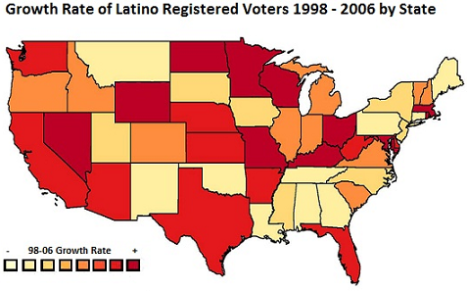By: Matt Barreto, Loren Collingwood, Sylvia Manzano
The importance of the Latino electorate has been the subject of both academic inquiry and media discourses. The question of Latino influence is frequently limited by an approach that focuses on single variable considerations (e.g., voter turnout or ethnic-targeted campaign spending) that are often contest-specific idiosyncrasies. Relying on theoretically appropriate concepts, we measure Latino political influence as a function of three factors: in-group population traits, electoral volatility, and mobilization (download research paper here). Using the 2008 presidential election as an example, we demonstrate the utility of incorporating a multifaceted measure that accounts for the contemporary complexity within the electoral environment. Because this framework is rooted in theoretical concepts, as opposed to discrete group or contest characteristics, it may be applied to any “influence group” in different electoral settings. Data are culled from several publicly available outlets, making it possible for election observers to replicate these measures and further investigate questions associated with group influence in American politics.
Applying this model to 2010, there are many states where Latinos could possibly influence the outcome of statewide elections including California, Nevada, Colorado, New Mexico, Illinois, Florida, Rhode Island, Massachusetts, Connecticut, Pennsylvania and Ohio.

Filed under: 2008 Polls/Elections, 2010 Polls/Elections, Election analysis, Research papers | Tagged: Latino influence | Comments Off on How to measure Latino influence: a new quantitative model







You must be logged in to post a comment.